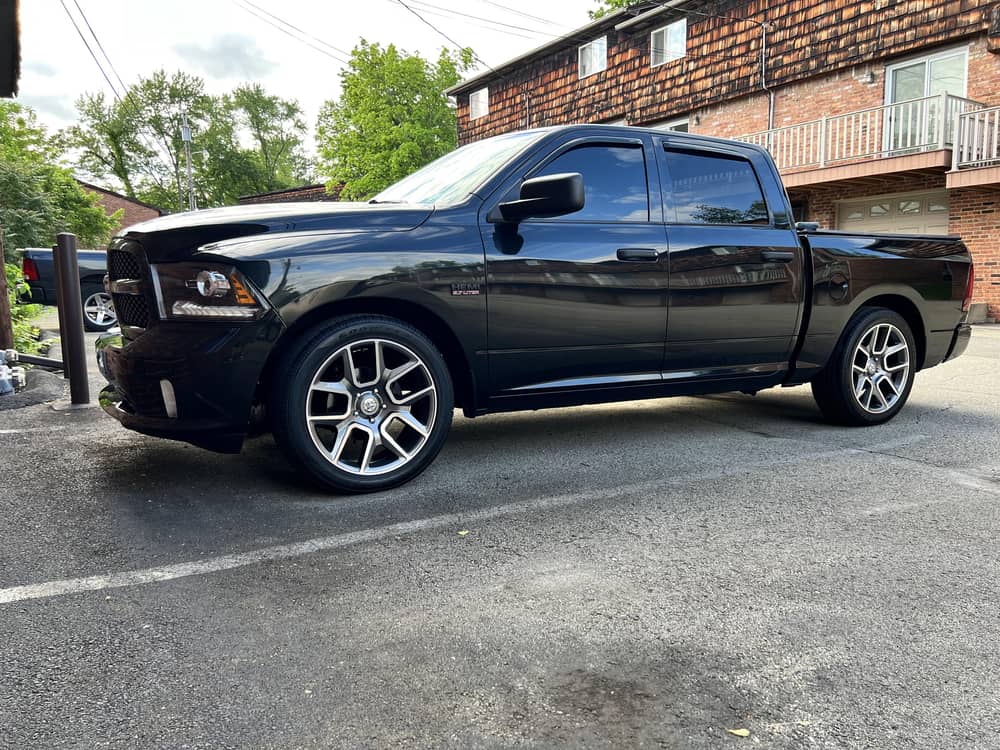Large-sized rims have grown in favor in the vehicle customizing market in recent years. 24-inch wheels are becoming a popular choice for truck owners looking to improve the look of their vehicles. Despite the attractiveness of these eye-catching rims: Are 24 inch rims bad for your truck? This contentious issue has spurred heated debate among truck fans, mechanics, and safety experts.
This article discusses the advantages and disadvantages of placing larger rims on trucks. It will investigate the effect on vehicle performance, handling, and fuel efficiency. We also address issues with safety, ride quality, and potential mechanical problems. Let’s see if 24-inch rims are a good investment or a risk.
What Are 24 Inch Rims?
The size of the wheels that can be mounted on a vehicle, usually a car or a truck, is referred to as 24-inch rims. The diameter of the wheel is determined by taking a measurement from the inside of one rim to the inside of the other rim. In the automotive aftermarket, these larger-sized rims have grown in popularity as a means for car owners to personalize and improve the aesthetic of their automobiles.
When individuals talk of 24-inch rims, they frequently only mean the diameter of the wheel and not the full wheel assembly including the tire. The tire size that fits a 24-inch rim might vary, and for performance and safety reasons, it’s crucial to select the right tire size that matches the rim diameter. Larger rims, like those measuring 24 inches, can give a car a more eye-catching and sporty appearance.
Are 24 Inch Rims Bad For Your Truck?

The controversy over whether 24-inch rims are detrimental for your truck has long raged in the automotive world. While these bigger wheels unquestionably offer visual appeal, there are various aspects to consider before replacing your truck’s rims.
Impact On Performance
One of the biggest issues with 24-inch rims is the potential impact on the truck’s performance. Larger wheels and tires add unsprung weight, which can impair acceleration, braking, and overall handling. The added weight can also put extra strain on the truck’s suspension system, potentially causing early wear and tear on vital components.
Comfortable
Another consideration is the effect on ride comfort. Smaller sidewalls on 24-inch tires result in less tire flex, which means less cushioning from bumps and faults in the road. This can result in a harsher and less comfortable ride, especially on rocky or uneven terrain.
Fuel Efficiency
Furthermore, larger rims can have an impact on the fuel efficiency of the truck. Larger tires’ extra weight and increased rolling resistance can result in lower gas mileage. Furthermore, the increased pressure on the engine and drivetrain may result in increased maintenance expenditures over time.
Safety
Another critical consideration is safety. Lower-profile tires are frequently required for larger rims. It can impair the tire’s capacity to absorb shocks and retain proper traction, especially in inclement weather. This loss of grip may result in longer stopping distances and poorer stability during rapid maneuvers, thus increasing the danger of an accident.
Furthermore, because it affects the original equipment specs, installing 24-inch rims may violate the truck’s warranty. Vehicles are designed with carefully selected wheel and tire sizes to guarantee best performance and safety. Deviations from these criteria can have unanticipated effects on many elements of the truck’s performance.
Therefore, installing 24-inch rims on your truck should be based on a detailed assessment of your priorities and driving preferences. While these enormous wheels can certainly improve the vehicle’s appearance, they may degrade performance, riding comfort, fuel efficiency, and safety. If you decide to update, you should contact a professional to confirm that the new rims and tires are compatible with your truck and exceed safety standards.
Benefits Of 24 Inch Rims

24-inch rims provide various advantages to car owners. Those trying to improve the visual attractiveness and modify their automobiles or trucks, in particular. Here are some of the benefits of using 24-inch rims:
Aesthetic Appeal
One of the most obvious advantages of 24-inch rims is their eye-catching appearance. These huge wheels have a dramatic and eye-catching appearance that can substantially improve the vehicle’s overall appearances. Many car enthusiasts and owners pick wider rims to distinguish their vehicles from the crowd.
Improved Handling
Larger rims might add unsprung weight, but they also have a wider track width. This can help to increase handling and cornering ability. The wider stance can provide additional stability during high-speed maneuvers, allowing the driver to drive more confidently and responsively.
Upgraded Braking Performance
Larger rims can sometimes support larger brake calipers and rotors, resulting in better braking performance. The increased surface area of the brake components can improve heat dissipation and lessen braking fade while braking for lengthy periods of time or aggressively.
Larger Tire Options
Tires with varied tread patterns and performance characteristics can be used on 24-inch rims. This adaptability enables owners to choose the tires that best suit their driving tastes. It aids in improving grip, comfort, and all-season versatility.
Customization Possibilities
Because 24-inch rims are so popular, there is a vast range of designs, coatings, and materials to choose from. This variation provides automobile owners with numerous options for customizing. Drivers may pick the appropriate rims to match their personal style and preferences.
Raising Vehicle Height
In the case of trucks or SUVs, 24-inch rims can be combined with lower-profile tires to raise the overall ride height significantly. This modification can give you a more dominating presence on the road and may provide you extra ground clearance for off-road activities.
However, it is important to realize that, while 24-inch rims have advantages, they also have possible problems, as mentioned in the preceding response. To offer the finest overall driving experience for your specific needs and tastes, it’s critical to find a balance between beauty and practicality.
Read this post: Will 20-Inch Rims Fit A Chevy Impala? (For Beginners)
Should I Use 24 Inch Rims For My Truck?
The decision to put 24-inch rims on your car is influenced by a number of elements and considerations. Here are some considerations to help you make an educated decision:
Aesthetics vs. Practicality
Consider whether your primary purpose for installing 24-inch rims is primarily aesthetic. Larger rims may be appropriate if you favor the stunning appearance and are willing to tolerate potential compromises in performance and comfort.
Driving Conditions
Consider the normal driving situations you face. Larger rims might cause a rougher ride and less traction on rocky or uneven terrain. If you frequently drive on badly maintained roads or in places with severe weather, 24-inch rims may not be the best option.
Vehicle Type
The effect of 24-inch rims will differ based on the sort of vehicle you own. The impact on handling may be less pronounced in sports cars or vehicles with high-performance suspensions. However, the trade-offs in performance and safety may be more severe for trucks and SUVs.
Safety Considerations
Safety should always be a major consideration. Larger rims can affect braking performance, handling, and stability. Ensure that the new rims and tires fulfill safety regulations and provide enough grip in all driving circumstances.
Maintenance and Costs
Larger rims can be more expensive to buy, while low-profile tires can have a shorter lifespan and be more expensive to repair. Furthermore, potential suspension or alignment concerns may raise maintenance expenses over time.
Manufacturer Guidelines
Check with the manufacturer to see if they have any rim size recommendations or limits. If you deviate greatly from the prescribed sizes, your warranty may be voided.
Take a Test Drive
If possible, take a test drive in a vehicle with 24-inch rims to get a firsthand feel for the ride quality and handling. This will give you a better idea of how your vehicle would feel with larger rims.
Consultation with Experts
Speak with a qualified mechanic or automobile expert. They may assist you in comprehending the implications of upgrading to 24-inch rims.
Final Thoughts
While 24-inch rims provide an eye-catching cosmetic boost for vehicles, they may sacrifice performance, riding comfort, and safety. When deciding on rim size, consider personal preferences and safety first, conferring with professionals if necessary.
